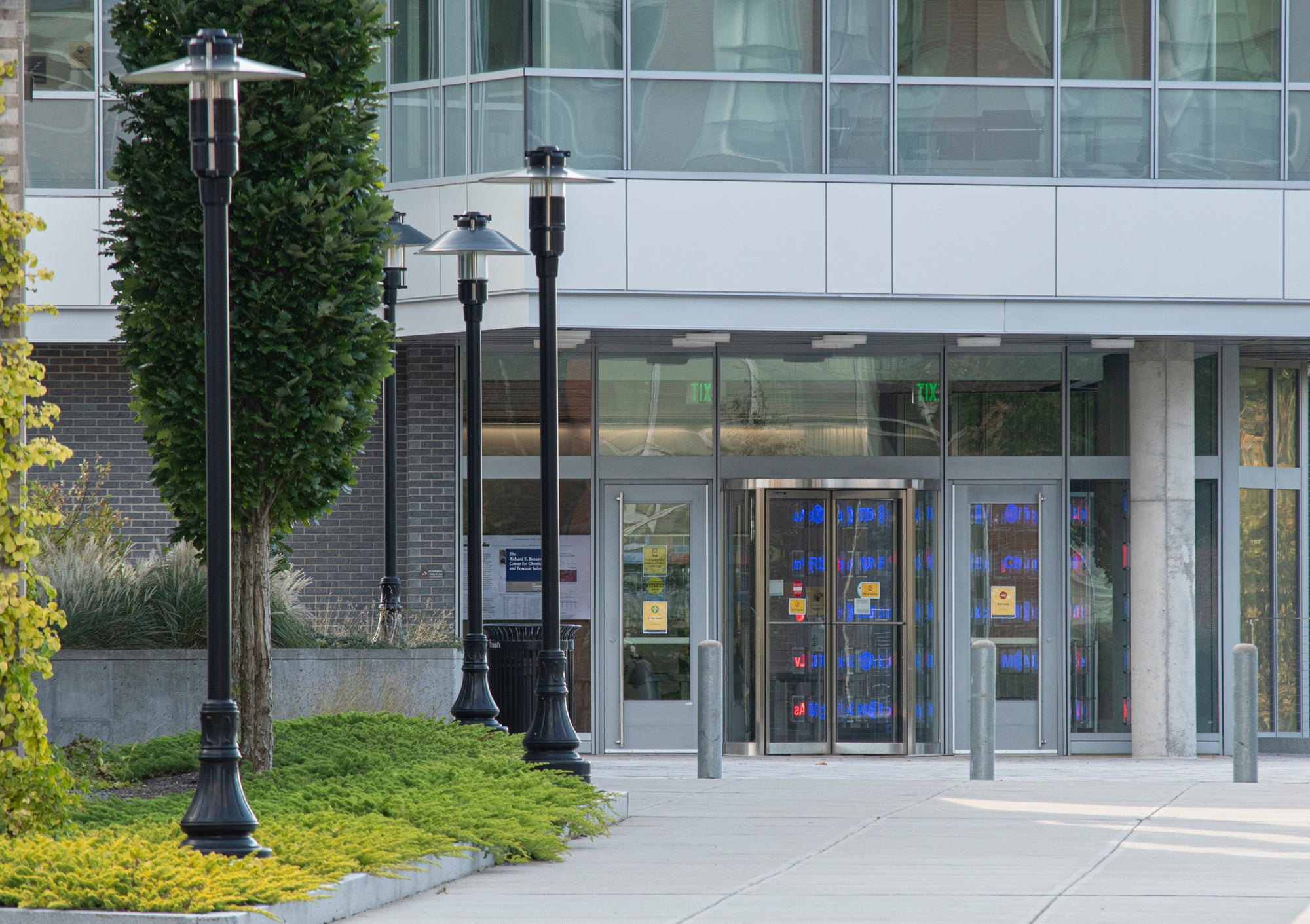KINGSTON, R.I. – March 1, 2023 – Things can get a little grim in the University of Rhode Island’s Beaupre Center on Friday afternoons — and that’s by design. It’s not too scary for the attending students, however: they are there to learn. The gathering calls together experts on the subject of crime, its prevention and investigation.
Experts on arson, DNA analysis, and forensic psychiatry are among the speakers for the spring University of Rhode Island Forensic Science Seminar Series, which runs Friday afternoons through April 28.
The annual series — which also includes lectures on toxicology and active shooter scenarios — is held in Room 100 of the Beaupre Center for Chemical and Forensic Sciences on URI’s Kingston Campus, on Friday afternoons in the fall and spring semesters, from 3:30 to 5 p.m. The building is home to the University’s robust chemistry program and also houses a federal Homeland Security Center of Excellence for Explosives Detection, Mitigation and Response. URI’s Forensic Science Partnership represents a model of successful investment in the chemistry program at URI in close partnership with the State Crime Laboratory, within the College of Pharmacy.
This is the 24th year of the free, public seminar series, which offers lectures in the fall and spring. See the full schedule.
Dennis Hilliard, director of the Rhode Island State Crime Laboratory at URI — and possessor of probably one of the more unique Rolodexes in the state — has coordinated the speaker series since 1999. “We are fortunate to have so many well-respected presenters come to URI,” he says. His colleague Jimmie Oxley, URI chemistry professor and a world-known explosives expert, kicked off this year’s spring session in January.
This winter, attendees also heard about crime scene investigation and the “C.S.I. Effect” (where crimes are neatly wrapped up in an hour). Leslie Nolan of the Rhode Island Department of Health described the illegal drugs currently being seen in the state’s Drug Chemistry Laboratory, while Virginia Maxwell from the University of New Haven brought the hidden world of dogfighting to light. Links to talks by prior speakers can be viewed here.
The remaining speakers and topics this spring are:
March 3 – “Arson and Fire Investigations,” deputy state fire marshals Paul Manning and James Given of the Rhode Island State Fire Marshal Office. The office is responsible for conducting investigations of all fires in Rhode Island where arson is suspected and is active in fire prevention education for citizens of all ages.
March 10 – “Forensic Toxicology,” Alexis Donaway, Rhode Island Department of Health. Donaway will discuss the use of toxicology, chemistry and pharmacology to aid investigations.
March 24 – “Active & Mass Shooters,” Katherine Schweit. Schweit served with the Federal Bureau of Investigation for 20 years, helping to jail bank robbers, kidnappers, and domestic terrorists, while working with police responding to mass casualty and active shooter incidents. Schweit created the FBI’s Active Shooter program and has since devoted her energy to helping prevent more tragedies.
March 31 – “DNA Analysis,” Cara Lupino, Rhode Island Forensic Lab. Lupino (M.S. ’04) is the supervisor of forensic biology at the Rhode Island Department of Health, Center for Forensic Sciences. She has testified numerous times as an expert witness in forensic biology and forensic DNA. Lupino will provide an overview of forensic biology and DNA in Rhode Island and the emerging field of forensic investigative genetic genealogy.
April 7 – “Questioned Documents – Forensic Document Analysis,” Kenneth Zercie, University of New Haven, Connecticut, forensics consultant. Zercie has an extensive background in law enforcement and previously served as director of Connecticut’s state scientific services division. He also has a private forensic consulting business and has testified in a number of high-profile cases.
April 14 – “Forensic Psychiatry: What Does It All Mean?,” Daniel Greenfield, Albert Einstein College of Medicine / Seton Hall University. Greenfield is a board-certified psychiatrist, preventive medicine specialist, and addiction medicine specialist. He has had extensive clinical and forensic experience in psychiatry and addiction medicine and is the author of “Writing Forensic Reports: A Guide for Mental Health Professionals.”
April 21 – “Cold Case Evidence,” Elaine Pagliaro, Henry C. Lee Institute of Forensic Science. Pagliaro retired from the Connecticut Department of Public Safety Forensic Science Laboratory, where she was involved in most of the state’s major criminal investigations, such as the Martha Moxley murder and the infamous “Woodchipper Murder” case. She is a qualified expert witness.
April 28 – “Isabella Stewart Gardner Theft,” Anthony Amore is Director of Security and Chief Investigator at the Isabella Stewart Gardner Museum, where he is charged with the ongoing efforts to recover thirteen works of art stolen from the museum more than 30 years ago. As an expert in security matters, especially those related to cultural property and homeland security, he will take the audiences step-by-step through the heist which occurred on March 18, 1990.
URI’s Forensic Science Seminar Series is offered for credit, and is also open to the public at no cost. Since its inception in 1999, the series has brought a range of speakers to URI, discussing everything from blood spatter and hair analysis to Sherlock Holmes and terrorism, welcoming experts from the Smithsonian, NCIS, the U.S. Secret Service, Israeli Police, Innocence Project, FBI, and more.
Those who cannot attend in person may view the lectures live online or at a later date by visiting https://www.chm.uri.edu/forensics/seminars.php and clicking on the topic links.
To learn more about the URI Forensic Seminar Series and be added to the series’ email list, email Dennis Hilliard, M.S. ’80, Rhode Island State Crime Laboratory, at dhilliard@uri.edu, or call 401-874-5056.

